
Episodes

Friday Dec 20, 2024
Friday Dec 20, 2024
In this episode of Echoes of War, hosts Craig and Gaurav take a humorous journey through history as they delve into Winston Churchill's memorable visit to Franklin D. Roosevelt at the White House during Christmas 1941. Discover the lighter side of wartime politics as the duo recounts stories of holiday cheer mixed with Churchill's legendary drinking habits, including a surprising list of infamous historical figures known for their love of alcohol.
Listeners will learn about Churchill's eccentric routines, including his penchant for late-night discussions with FDR, his unique breakfast habits, and even a daring skinny dip interrupted by a shark! Dive into the rich history of Churchill and FDR's relationship as they navigate the complex political landscape of World War II while sharing a drink or two. This episode promises laughter, history, and a glimpse into the personal lives of two of the 20th century's most influential leaders.
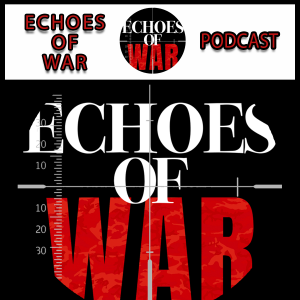
Friday Dec 13, 2024
Echoes of War: A New Journey Begins
Friday Dec 13, 2024
Friday Dec 13, 2024
Welcome to a new era for Echoes of War, where hosts Craig and Gaurav embark on an exciting journey to broaden the horizons of military history. In this special episode, they unveil their plans to expand beyond the Pacific War, delving into military conflicts from different ages and regions.
Listeners are in for a treat as the hosts discuss their diverse interests and expertise, from ancient Greek and Roman conflicts to the complexities of more recent wars. With insight into various historical eras, Craig and Gaurav aim to bring fresh perspectives and captivating stories to the podcast.
In addition to updates about the future of the channel, they engage in riveting discussions about lesser-known battles, intriguing historical figures, and fascinating military tactics. Whether it's the opium wars or the intricacies of Spartan culture, Echoes of War promises to deliver engaging and informative content for history enthusiasts.
Join the conversation and share your thoughts as Echoes of War embraces a world of military history without limits. Your feedback will shape the topics they explore, ensuring a rich and varied listening experience for all fans of history.
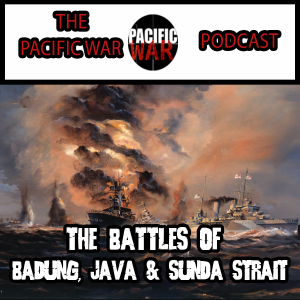
Friday Dec 06, 2024
Friday Dec 06, 2024
In this riveting episode of Echoes of War, hosts Craig from the Pacific War Channel and his co-host Gaurav delve into the dramatic naval battles between Dutch and Japanese forces during the Pacific War. The episode highlights the fierce encounters over strategic territories, such as the Battle of Badung, the First Battle of Java Sea, and the Battle of Sunda Strait. These battles mark a significant phase in the Dutch-Japanese-Pacific Naval War mini-series.
Listeners are taken back to a time when, following the attack on Pearl Harbor, Japan advanced its war strategy aggressively, targeting key locations like the Dutch East Indies for their vital resources. The episode describes the intense skirmishes and high stakes engagements as Allied forces, despite being overwhelmed, launched bold attacks to curb Japanese expansion.
The episode also addresses the technological disparity faced by the Dutch and their Allies, characterized by unfortunate mishaps and a lack of coordination, yet showcasing remarkable bravery and determination. This episode is a testament to lesser-known yet pivotal moments in the Pacific conflict, offering a detailed exploration of strategy, leadership, and the relentless pursuit for dominance on the high seas.
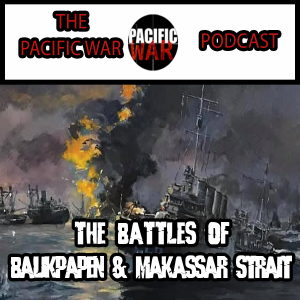
Friday Nov 29, 2024
Friday Nov 29, 2024
Craig and Gaurav go over the early naval engagements between the Dutch and Japanese during the Pacific War.
Two weeks after the Pearl Harbor attack, Japan accelerated its plans to invade the Dutch East Indies for vital oil resources, essential for its war efforts. As Japanese forces swiftly advanced in the Philippines, they captured strategic locations, including Mindanao and Davao, while Allied defenses crumbled. In late December 1941, Japan launched further assaults in Malaya, isolating Singapore and diminishing Allied naval power. By January 1942, Japanese forces targeted Balikpapan, a crucial oil hub in Borneo. The Dutch, determined to defend their territory, prepared for a guerrilla campaign and attempted to sabotage oil facilities. However, the Japanese invasion fleet approached Balikpapan on January 21, 1942. Despite Allied air attacks and submarine efforts, the Japanese landed on January 24, marking a significant step in their campaign to secure the East Indies, while the Allies faced overwhelming challenges and dwindling resources.
In the early hours of January 24, 1942, Talbot's destroyers stealthily approached the anchored Japanese fleet, illuminated by burning oil facilities. Utilizing torpedoes for surprise attacks, they struck swiftly, sinking several transports, including Sumanoura Maru. Despite their efforts, many torpedoes missed, and the Japanese fleet sustained fewer losses than expected. By dawn, the Allies had achieved a tactical victory, but nine of twelve transports survived, allowing the Japanese advance into the Dutch East Indies to continue. In February, an Allied strike force was formed, but they faced devastating air assaults, retreating to Surabaya after suffering heavy damage without losing ships.
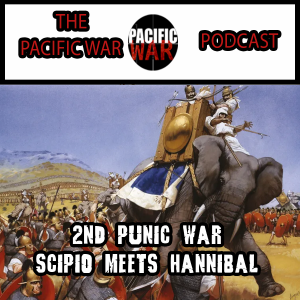
Friday Nov 22, 2024
The 2nd Punic War 🎙️ Scipio meets Hannibal
Friday Nov 22, 2024
Friday Nov 22, 2024
Welcome to Echoes of War, the newly revamped podcast formerly known as the Pacific War Podcast. Join Pacific War Craig and Gaurav as they explore military history throughout the ages. In this climactic episode, we delve into the gripping conclusion of the Second Punic War, focusing on the legendary generals Hannibal Barca and Scipio Africanus.
As the third part of this mini-series, we recount the events leading up to the decisive Battle of Zama, where the two masterminds finally face off. Discover the political maneuvers, strategic battles, and personal rivalries that defined this historic conflict. From Hannibal's tactical genius to Scipio's bold strategies, this episode provides a captivating overview of one of history's most renowned military showdowns.
Join us as we explore the aftermath of Zama, the implications for Rome and Carthage, and the enduring legacy of these legendary figures in military history. Don't miss out on this thrilling episode of Echoes of War!
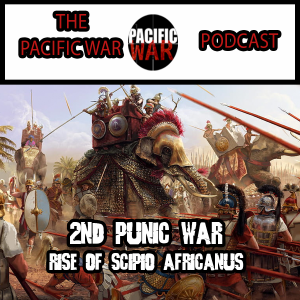
Friday Nov 15, 2024
The 2nd Punic War 🎙️ The Rise of Scipio Africanus
Friday Nov 15, 2024
Friday Nov 15, 2024
Welcome to the Echoes of War podcast, formerly known as the Pacific War channel. In this riveting episode, hosts Craig and Gaurov delve into the fascinating journey of one of Rome's most celebrated generals, Scipio Africanus. As Rome reels from the devastating defeat at Cannae, Scipio emerges as a beacon of hope, poised to change the tides of the Second Punic War.
Join us as we explore Scipio's early life, his prestigious lineage, and his meteoric rise through the Roman political and military ranks. Discover how this young commander, known for his intelligence, culture, and unconventional tactics, managed to rally Rome's forces and take the fight to the Carthaginian heartland.
Through strategic brilliance and a unique blend of clemency and diplomacy, Scipio wins over the tribes of Hispania and scores decisive victories against the Carthaginian armies. As the stage is set for the epic confrontation with Hannibal at the Battle of Zama, we delve into the political intrigues and alliances that shaped this pivotal period in history.
Don't miss this captivating episode that brings to life the legacy of Scipio Africanus, a leader who redefined Roman warfare and set the course for Rome's dominance in the ancient world.
Don't forget I have a Youtube Membership: https://www.youtube.com/channel/UCbp8JMZizR4zak9wpM3Fvrw/join
or my Patreon:
https://www.patreon.com/pacificwarchannel
where you can get exclusive content like "What if Japan invaded the USSR during WW2?" Don't forget to check out Private Internet Access using my link to receive 83% off, 4 months free with a 30 day money back guarantee ⤵️ https://www.piavpn.com/PacificWarChannel
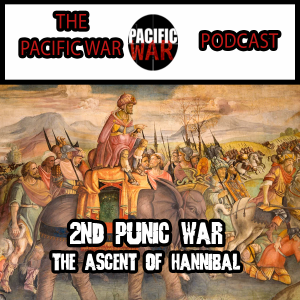
Friday Nov 08, 2024
The 2nd Punic War 🎙️ The Ascent of Hannibal
Friday Nov 08, 2024
Friday Nov 08, 2024
Join Craig from the Pacific War Channel and his co-host, Gaurav, as they dive into a new realm of military history in this captivating episode. They announce a shift in focus from the Pacific War to a broader exploration of military history, introducing their new podcast title, "Echoes of War." Despite this transition, their passion for history remains unwavering.
In this episode, they delve into the Second Punic War, spotlighting the legendary Carthaginian general, Hannibal Barca. Discover why Hannibal's feats against the Roman Empire were so extraordinary and how he became a revered figure even among his adversaries. Gaurav leads the discussion, providing an in-depth analysis of Hannibal's strategic genius, his audacious crossing of the Alps, and his remarkable victories against the Romans.
Listeners will gain insights into the political and military landscape of ancient Rome and Carthage, the challenges Hannibal faced, and the innovative tactics he employed. As the story unfolds, the episode reveals how Hannibal's campaign in Italy reached its zenith at the Battle of Cannae, a masterclass in military strategy that continues to be studied to this day.
Tune in to learn about the rise of one of history's greatest military commanders and the dramatic events that shaped the ancient world.
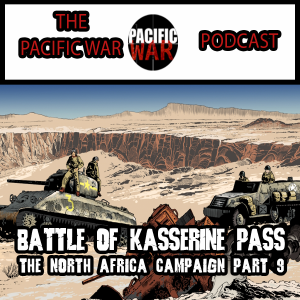
Friday Nov 01, 2024
Friday Nov 01, 2024
Craig and Gaurav cover the Race to Tunisia and Battle of Kasserine Pass during the North Africa Campaign
In November 1942, following the Darlan Deal, Hitler ordered the occupation of Vichy France and Corsica. Resistance was minimal, but in Toulon, the French scuttled their fleet, destroying 77 ships to prevent Axis capture. In Tunisia, Axis forces established beachheads, while Allies, led by British Lt. Gen. Kenneth Anderson, pushed to preempt Axis reinforcements. The Allies advanced through strategic ports and airfields, engaging in intense skirmishes but facing stiff Axis resistance and Luftwaffe attacks.
The Allies eventually stalled in battles like Djedeida, suffering losses from Tiger tanks and counterattacks by German Panzers. By December, fresh reinforcements on both sides set the stage for further battles. With Field Marshal Rommel’s forces now retreating from Tripoli, Axis troops launched offensives like Operation Eilbote I, aiming to safeguard supply lines and control strategic passes, while the Allies regrouped and reinforced.
In February 1943, the Axis offensive culminated in the Battle of Kasserine Pass. Axis forces, bolstered by German and Italian units, launched devastating assaults, routing the Allies and inflicting heavy losses in men and equipment. U.S. forces, notably unprepared, struggled to contain the attack but managed a defensive line near Thala and Tébessa with British assistance.
The Kasserine debacle underscored Allied command failures, leading Eisenhower to restructure leadership. Generals Alexander and Patton assumed control, initiating reforms that set the Allies on a path to eventual success in North Africa.
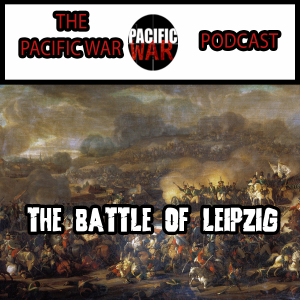
Friday Oct 25, 2024
The Battle of Leipzig: A Turning Point in the Napoleonic Wars
Friday Oct 25, 2024
Friday Oct 25, 2024
Join Craig from the Pacific War Channel and his co-host Gaurav as they delve into one of the most significant battles in history, the Battle of Leipzig. Often overshadowed by the more famous Battle of Waterloo, Leipzig played a crucial role in the Napoleonic Wars, marking a turning point that led to the downfall of Napoleon's empire.
In this episode, Craig and Gaurav explore the complex political and military landscape of early 19th-century Europe. They discuss Napoleon's rise to power, his strategic blunders, and the coalition forces' innovative strategies that ultimately led to his defeat. The hosts provide a detailed account of the battle, the tactics employed, and the immense scale of the conflict, which involved over half a million soldiers from multiple nations.
Listeners will gain insights into the broader implications of the Battle of Leipzig, including its impact on European geopolitics and the eventual reshaping of the continent. Whether you're a history enthusiast or new to the Napoleonic era, this episode offers a comprehensive look at a pivotal moment in world history.

Friday Oct 18, 2024
North African Campaign Part #8 🎙️ Operation Torch
Friday Oct 18, 2024
Friday Oct 18, 2024
Join Craig from the Pacific War Channel and his co-host, Gaurav, as they delve into the fascinating history of Operation Torch, the first major Allied amphibious assault in North Africa during World War II. This episode provides an in-depth look into the strategic planning and execution of the operation, highlighting the key figures and events that shaped its outcome.
The discussion begins with the strategic context behind Operation Torch, explaining how the Allies decided on a Europe-first strategy, prioritizing the defeat of Nazi Germany. Craig and Gaurav explore the complex political dynamics involving the United States, Britain, and the various factions within France, including the Vichy regime, Free French forces, and French resistance groups.
As the episode unfolds, listeners will learn about the intricate details of the landings at Algiers, Oran, and Casablanca, including the challenges faced by the Allied forces and the resistance offered by the Vichy French troops. The episode also covers the significant naval engagements and the diplomatic maneuvers that ultimately led to the defection of the Vichy French forces to the Allies.
Throughout the episode, Craig and Gaurav provide insightful commentary on the broader implications of Operation Torch, including its impact on the North African campaign and its role in shaping future Allied operations. This episode is a must-listen for history enthusiasts interested in the pivotal moments of World War II.
